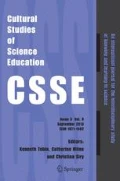Abstract
This article explores Vanessa Anthony-Stevens and Sammy Matsaw’s paper “The productive uncertainty of Indigenous and decolonizing methodologies in the preparation of interdisciplinary STEM researchers”. That paper reports on a small qualitative study on how STEM students in the field of natural resources management react to the inclusion of Indigenous ways of knowing in their interdisciplinary research methodologies course. The authors are engaging contested intersections of knowledge that are notoriously difficult to negotiate. I argue that the inclusion of Indigenous ‘ways of knowing’ into the water resource management curriculum is based on Morgan’s (in: McKinley, Smith (eds) Handbook of indigenous education, Springer, Singapore, pp 111–128, 2019. https://doi.org/10.1007/978-981-10-3899-0) idea of the ‘guest paradigm’. At the same time, and in contrast, I also argue that the inclusion of Indigenous knowledge in the curriculum cannot just occur in the classroom but needs to be considered at an institutional and individual level as well. The project should be seen as a small step within a wider Indigenous agenda of decolonizing the Eurocentric curriculum.
Similar content being viewed by others
References
Freire, P. (1970). Pedagogy of the oppressed. New York: Seabury Publishers.
Grande, S. (2019). Refusing the settler society of the spectacle. In E. A. McKinley & L. T. Smith (Eds.), Handbook of Indigenous education (pp. 1013–1027). Singapore: Springer. https://doi.org/10.1007/978-981-10-3899-0.
Jackson, M. (2019). In the end “The hope of decolonization”. In E. A. McKinley & L. T. Smith (Eds.), Handbook of Indigenous education (pp. 101–110). Singapore: Springer. https://doi.org/10.1007/978-981-10-3899-0.
McKinley, E. (2007). Bodies of knowledge: Narratives of colonialism, science and education. In K. Tobin & W.-M. Roth (Eds.), The culture of science education (pp. 343–354). Rotterdam: Sense Publishers.
McKinley, E., & Gan, M. (2014). Culturally responsive science education for Indigenous and ethnic minority students. In S. Abell, & Lederman, N. (Eds.), Handbook of research on science education. Volume II (pp. 284–300). Mahwah, NJ: Lawrence Erlbaum.
McKinley, E., & Smith, L. T. (2019). Towards self-determination in Indigenous education research: An introduction. In E. A. McKinley & L. T. Smith (Eds.), Handbook of Indigenous education (pp. 1–15). Singapore: Springer. https://doi.org/10.1007/978-981-10-3899-0.
Morgan, B. (2019). Beyond the guest paradigm: Eurocentric education and aboriginal peoples in NSW. In E. A. McKinley & L. T. Smith (Eds.), Handbook of Indigenous education (pp. 111–128). Singapore: Springer. https://doi.org/10.1007/978-981-10-3899-0.
Morse, J. (2006). The politics of evidence. Qualitative Health Research,16(3), 395–404. https://doi.org/10.1177/1049732305285482.
Nakata, M. (2007). The cultural interface. The Australian Journal of Indigenous Education (Supplement),36, 7–14. https://doi.org/10.1017/S1326011100004646.
Neri, R. C., Lozano, M., & Gomez, L. M. (2019). (Re)framing resistance to culturally relevant education as a multilevel learning problem. Review of Research in Education,43, 197–226. https://doi.org/10.3102/0091732X18821120.
Smith, G. H. (1997). Kaupapa Māori: Theory and praxis. PhD Thesis and Monograph. Auckland, New Zealand: The International Research Institute of Māori and Indigenous Education, Faculty of Education, University of Auckland.
Smith, G. H., & Smith, L. T. (2019). Doing Indigenous work: Decolonizing and transforming the academy. In E. A. McKinley & L. T. Smith (Eds.), Handbook of Indigenous education (pp. 1075–1101). Singapore: Springer. https://doi.org/10.1007/978-981-10-3899-0.
Author information
Authors and Affiliations
Corresponding author
Additional information
Publisher's Note
Springer Nature remains neutral with regard to jurisdictional claims in published maps and institutional affiliations.
Lead editor: Michael J. Reiss.
This review essay addresses issues raised in Vanessa Anthony-Stevens and Sammy Matsaw’s paper entitled: The productive uncertainty of indigenous and decolonizing methodologies in the preparation of interdisciplinary STEM researchers. https://doi.org/10.1007/s11422-019-09942-x.
Rights and permissions
About this article
Cite this article
McKinley, E. The cultural interface tension: doing Indigenous work in the academy. Cult Stud of Sci Educ 15, 615–621 (2020). https://doi.org/10.1007/s11422-019-09963-6
Received:
Accepted:
Published:
Issue Date:
DOI: https://doi.org/10.1007/s11422-019-09963-6



